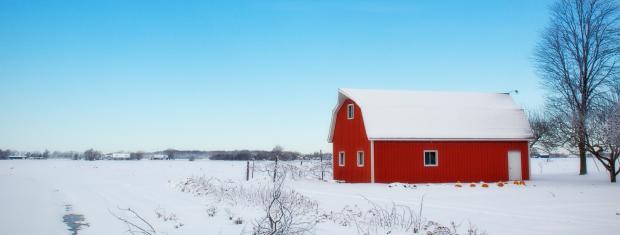
Preparing Your Farm for Cold Winter Temperatures
With the days getting shorter and nights getting longer, it’s vital to prepare your farm for the harsh months ahead. Winter can be costly for farms as wind, freezing temperatures and storms all have the potential to cause severe damage. We’ve got a few tips to help you minimize the risks of winter-related damage:
Water
- Inspect the heating on waterers to ensure constant water access, repairing leaks to avoid freezing pipes and wet environments for livestock.
- Ensure piping is properly insulated for below freezing temperatures.
- Isolate outdoor water supplies by turning off stop valves.
- Check field drains and identify flood risks.
- Have a plan in place if something does go wrong. Ensure you’ve got adequate water storage and keep your plumbers number handy in case a pipe does burst.
Buildings
- Inspect roofs on all farm buildings – including the farmhouse, livestock housing and equipment sheds. Ensure you have no leaks and check for loose tiles that might dislodge in heavy winds. It’s better to repair leaks now than in the middle of a vicious snowstorm.
- Consider adding additional insulation to keep buildings warm and seal any cracks surrounding windows.
- Prepare for a roof collapse – sometimes a heavy snowfall can force a roof to cave in. Be prepared to cordon off this area until a safety inspection has been carried out.
Livestock, Feed & Bedding
- Move animals inside a well-ventilated barn or provide adequate shelter from the wind, especially calves with a lower percentage of body fat. Both cold weather and poor air quality will stress animals.
- Consider calf jackets to keep young calves dry and warm, this is vital during the first two weeks of their life when they are undergoing the first stages of growth and development.
- Stock up with adequate feed on the farm to get your livestock through the winter months.
- Make sure bedding is deep and able to wick away moisture from your livestock, staying dry. To avoid moisture, put down a layer of saw dust or sand and top it off with wood shavings or straw. This will give your animals the ability to nest and maintain a healthy body temperature throughout the winter. Never store bedding near combustibles within sheds, especially during winter months.
Transport & Access
- Ensure there is always a clear entry and exit on the farm for not only yourself, but also delivery, collection vehicles and emergency services vehicles.
- Have plenty of salt or grit on hand to keep icy roads and pathways clear.
Machinery
- Service and clean machinery before storing it away for the season, failure to do so could result in mechanical failure come spring. For example, if you left debris in your combine harvester it can cause a fire when it is first started in the spring.
- If possible, store tractors in a shed when they aren’t in use.
- Fill the cooling system with an appropriate amount of fresh antifreeze, as it can get diluted if it is topped off throughout the year.
- Ensure batteries are fully charged to cope with being started in freezing conditions.
- Fully drain sprayers to protect them from damage.
Whatever weather this winter brings, it is better to have tried to safeguard your farm than to have not tried at all. Talk to your Rockford Mutual Agent about our Farmowners and Farmowners Umbrella policies so we can face the storm by your side.

Amy Casey
Social Media & Communications Specialist
Amy joined Rockford Mutual in January of 2017 with an Associates Degree in Marketing. Amy has a great understanding of insurance in general as she has obtained her Associate in General Insurance designation.

